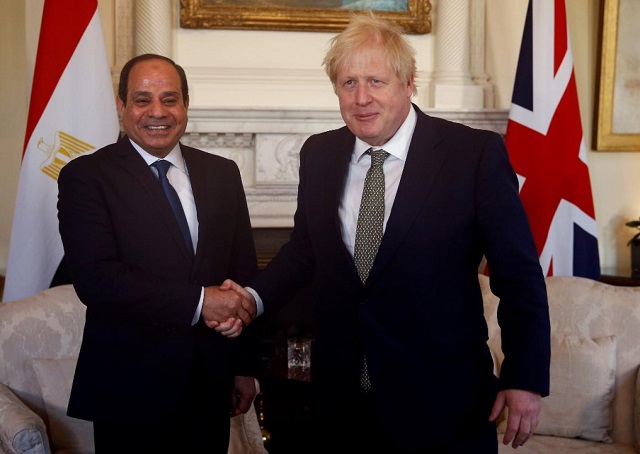A decade after the Arab Spring, Western hypocrisy over arms sales is more brazen than ever Comment
New in Ceasefire, Politics - Posted on Thursday, January 28, 2021 14:11 - 0 Comments
By Andrew Smith

British Prime Minister Boris Johnson hosts Egyptian President Abdel Fattah al-Sisi in London in January 2020. (Credit: AFP)
“Bread, freedom and social equality.” “The people demand the overthrow of the regime.” “Revolution until victory; revolution in Tunisia; revolution in Egypt.” These are just some of the chants that could be heard in Tahrir Square and across Egypt 10 years ago.
January 25 2011 was the first of 18 days of protest that preceded the fall of the autocratic Mubarak regime. Coming on the heels of the Tunisian revolution, it was a movement that spread across the region, with mass protests erupting in Yemen, Bahrain and beyond. The then UN Secretary General, Ban Ki Moon, remarked that the protest movement had “transformed the geopolitical landscape” while his predecessor, Kofi Annan, compared it to the decolonisation process.
The protesters were met with the full force of the state. 846 people were killed in Egypt alone, with many more detained or injured. Allegations of torture were widespread as the regime sought reprisals against those who campaigned against it. Tear gas and live ammunition was used as police cracked down on protesters. Some of the tear gas was made here in the UK.
The old order certainly had powerful defenders. The then American Vice-President, Joe Biden, referred to Egyptian dictator Hosni Mubarak as ‘an ally of ours in a number of things’ insisting that he would ‘not refer to him as a dictator.’ Former British PM Tony Blair went further, branding him “immensely courageous and a force for good.”
Following Mubarak’s enforced departure, British PM David Cameron headed to Cairo where he spoke of being ‘inspired’ by the protests. However, he didn’t travel alone. He brought his Defence Minister, Gerald Howarth, and 15 representatives from UKTI (now the Dept of International Trade). They spent the next three days touring the region while accompanied by representatives of some of the UK’s biggest arms companies.
For all of Cameron’s talk about “inspiration” and “human rights”, it was obvious what side he was on. Three months later he gave the red carpet treatment to Salman bin Hamad al-Khalifa, crown prince of Bahrain, who made a high-profile visit to Downing Street. At the time of the visit, Bahraini protesters were living under martial law and UK-made armoured vehicles were being used by Saudi forces to assist in the crackdown.
A decade has now passed, and although some things have changed, many have stayed the same. One thing that has remained consistent is the hypocrisy and complicity of governments like the UK, who have continued to arm and support repression across the region.
In 2013, President al-Sisi took power in Egypt following a bloody coup. Since then, he has overseen some of the worst human rights abuses in the country’s modern history. A 2019 submission to the UN by human rights groups concluded that “torture is a systematic practice” in Egypt.
A small number of UK arms licences had been revoked following the Sisi coup, with a very weak and non-binding European Union embargo. But these were few and far between. In August 2013, the UK suspended 49 licences for arms to Egypt. However, only two months later 24 of these suspensions were lifted, with only seven being fully revoked and arms sales resuming almost straight away. In total, the UK has licensed £220 million-worth of military equipment to Egyptian forces since 2011, while also providing military support and training for the Egyptian armed forces and police. In 2015, Sisi was invited to Downing Street for yet another red carpet visit.
Meanwhile, the US had announced its own, slightly stronger, embargo in response to the Sisi coup, but that too was very quickly diluted. Within nine months, the government was back to exporting Apache helicopters to the regime, and nine months after that it announced that its embargo was being scrapped altogether, with $1.3 billion worth of arms being authorised on that same day. As one senior official in the Obama administration told Politico “we caved.”
With the repression in Egypt escalating, there is little hope for any meaningful change in policy. The UK and other western powers had been all-too-happy to prioritise arms company profits and overlook the abuses of Mubarak and his counterparts, just as they are doing today.
As one of the Egyptian protesters, Abdelrahman Ashraf, told Al Jazeera “I saw the worst of Egypt. I lived terrible days – but you don’t forget the feeling of a revolution. I was wounded – all four of us brothers were wounded. My story is not finished, and neither is Egypt’s revolution.” Events and resistance has not stopped in Egypt or the wider region, even if the performative solidarity of arms-dealing governments has.
Arms sales are one way in which complicit governments are providing practical and military support to Sisi and other despots in the region. These sales need to stop, and so does the hypocritical foreign policy that has allowed Boris Johnson and his colleagues to talk about the importance of human rights while providing an uncritical political and military support for Sisi and other brutal governments.


Leave a Reply